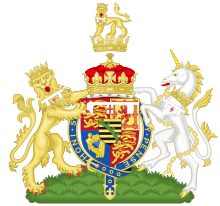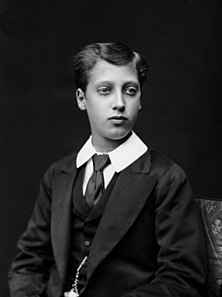Albert Victor, Duke of Clarence and Avondale
HRH Prince Albert Victor Christian Edward, Duke of Clarence and Avondale (born January 8, 1864 in Frogmore House , Berkshire , † January 14, 1892 in Sandringham House , Norfolk ) was a member of the House of Saxe-Coburg and Gotha . The eldest son of Edward VII was second to the throne of the British monarchy after his father until his early demise .
origin
Prince Albert Victor was born on January 8, 1864 at Frogmore House , an estate near Windsor Castle . He was the eldest son of the British heir to the throne Albert Eduard, Prince of Wales , the later King Edward VII and his wife Princess Alexandra of Denmark . His grandmother was the then ruling monarch of the British Empire , Queen Victoria . Prince Albert Victor was second to the throne after his father.
Education and training
The newborn was born two months early and weighed only three pounds at birth. As a result, "Eddy", as he was known in family circles, grew into a sickly, apathetic boy who was commonly described as retarded, nervous and indifferent. From 1871 onwards, their parents left the upbringing of Albert Victor and his younger brother George in the hands of John Neale Dalton , who prescribed a strict curriculum for the two princes, which was characterized by military drill and extreme discipline. Albert Victor's academic performance was very limited and he was a sluggish student who made slow progress.
For further training purposes Albert Victor and Georg served in the Royal Navy in 1877, initially in Dartmouth on the training ship HMS Britannia . The two midshipmen then embarked on a three-year trip around the world (1879 to 1882) with the HMS Bacchante . In addition to large parts of the vast empire such as the Falkland Islands , Egypt , the Cape Colony , Ceylon , Singapore , the Fiji Islands and Australia , they toured Palestine , Greece , China and Japan . Upon their return, the brothers were separated in 1883, and Albert Victor, prospective heir to the throne, was to be prepared for his coming duties at the venerable Trinity College , Cambridge . However, he showed little interest in the intellectual atmosphere there, and in most subjects he did not have even the most basic knowledge. Rather, the prince indulged in leisure activities such as polo , which is why it was even claimed that he could hardly read. In order to improve his German , Albert Victor studied for a few months at the University of Heidelberg in 1884 .
In 1885 Albert Victor left Cambridge and then served as a lieutenant with the 10th Royal Hussars in Aldershot , later in London-Hounslow . From now on he took on more official duties for the royal family, such as visits to Ireland and Gibraltar or the opening of Hammersmith Bridge in London . In 1889/90 he traveled through India for several months on behalf of the monarchy . On May 24, 1890, Queen Victoria bestowed on him the hereditary peer titles Duke of Clarence and Avondale and Earl of Athlone .
lifestyle
From his fun-loving Father Albert Victor had the tendency to alcohol inherited and easy life, including regular brothel visit. Though anything but intelligent, gifted, or well-read, he seemed very popular with women. But he was also said to have romantic relationships with men. Albert Victor is said to have been recognized as a suitor during a police raid in an illegal men's brothel in 1889 ( Cleveland Street scandal ). Two years later, the prince was blackmailed and paid two prostitutes £ 200 in hush money to get back letters of compromising content that he had written them.
Due to his unsteady behavior, Albert Victor began looking for a suitable bride at the instigation of his grandmother in the early 1890s. The search proved unsuccessful, as both his cousin, Princess Alix von Hessen-Darmstadt , and Princess Hélène d'Orléans rejected his applications. Eventually, through the mediation of Queen Victoria, he became engaged to Princess Maria von Teck on December 7, 1891 , and the family hoped her to make a positive impact. The wedding date was set for February 1892.
Sickness and death
From 1890 onwards, Albert Victor's health deteriorated and he repeatedly suffered from attacks of gout . This was probably due to alcohol and tobacco consumption, but STDs were also suspected. When, at the end of 1891, he was also infected by a flu epidemic, which developed into pneumonia , his condition became life-threatening. On January 12, 1892, he was shaken by attacks of fever and no longer recognized anyone who appeared at his sick bed. Two days later, Prince Albert Victor died with his immediate family at the age of 28 on Sandringham Estate , his father's country estate. It was later also suggested that the cause of death was not the flu but the sexually transmitted disease syphilis . Since he left no offspring, his peer titles expired upon his death.
His burial place is in St George's Chapel at Windsor Castle.
Prince Georg, his younger brother, took Albert Victor's place as presumptive heir to the throne and ascended the throne in 1910 as George V. At the request of Queen Victoria, he married his older brother's fiancée, Maria von Teck, in 1893 .
Awards, medals and decorations

- Knight Companion of the Order of the Garter (KG, 1883)
- Knight Companion of the Order of Saint Patrick (KP, 1887)
- Personal aide-de-camp to the Queen (ADC (P), 1887)
- Sub-Prior of the Order of Saint John (1888)
- Honorary Doctorate (LL.D.) from Cambridge University
- Honorary Doctorate (LL.D.) from Dublin University
- Grand Crusader of the Order of the Dutch Lion (Netherlands)
- Grand Cross of the Order of the Tower and the Sword (Portugal)
- Collane of the Order of Charles III. (Spain, 1885)
- Osmanje Order 1st Class (Ottoman Empire)
- Grand Cross of the Star of Romania (Romania)
- Knight of the Order of Annunciations (Italy)
- Grand Cross of the Imperial Order of the Cross (Brazil)
- Grand Cross of the Duke of Saxony-Ernestine House Order (Ernestine Duchies)
- Knight of the Elephant Order (Denmark)
- Grand Cross of the Order of Leopold (Belgium)
- Knight of the Black Eagle Order (Prussia)
- Grand Cross of the Order of Saint Stephen (Hungary)
Others
Since 1962 he has been mentioned repeatedly in connection with the Jack-the-Ripper murders. Minutes show, however, that he was not in London at all during the time of the crime and is therefore no longer among the suspects.
In Alan Moore and Eddie Campbell's graphic novel From Hell (as well as the film adaptation in which he is played by Mark Dexter ) , his relationship as Albert Sickert with a commoner is what triggered the Ripper murders.
In the British mini-series Jack the Ripper - The Treasure Of London of 1988 he was selected by Mark Culwick embodies.
literature
- Donald Spoto: The Windsors. 200 years of scandals and affairs. Expanded paperback edition. Heyne Verlag, Munich 1997, ISBN 3-453-13186-X , ( Heyne books 19, 565).
- Hendrik Püstow, Thomas Schachner: Jack the Ripper. Anatomy of a legend. Militzke Verlag, Leipzig 2006, ISBN 3-86189-753-9 .
- Albert Frederick Pollard: Albert Victor Christian Edward . In: Sidney Lee (Ed.): Dictionary of National Biography . Suppl. 1, Volume 1: Abbott-Childers. MacMillan & Co, Smith, Elder & Co., New York City / London 1901, pp 28 - 29 (English).
Web links
- Albert Victor Christian Edward Saxe-Coburg and Gotha, 1st Duke of Clarence and Avondale on thepeerage.com
- jacktheripper.de - German-language information portal
| personal data | |
|---|---|
| SURNAME | Albert Victor, Duke of Clarence and Avondale |
| ALTERNATIVE NAMES | Albert Victor Christian Edward; Eddy |
| BRIEF DESCRIPTION | Prince of Great Britain and Duke of Clarence and Avondale |
| DATE OF BIRTH | January 8, 1864 |
| PLACE OF BIRTH | Frogmore House , Berkshire |
| DATE OF DEATH | January 14, 1892 |
| Place of death | Sandringham House , Norfolk |


